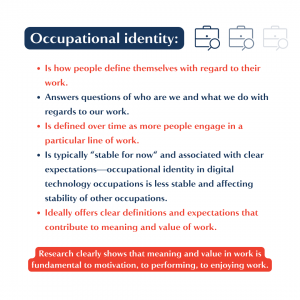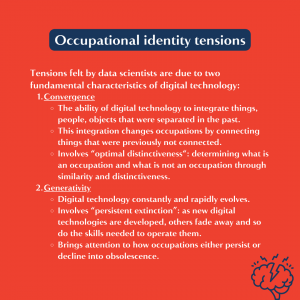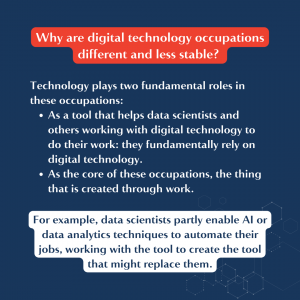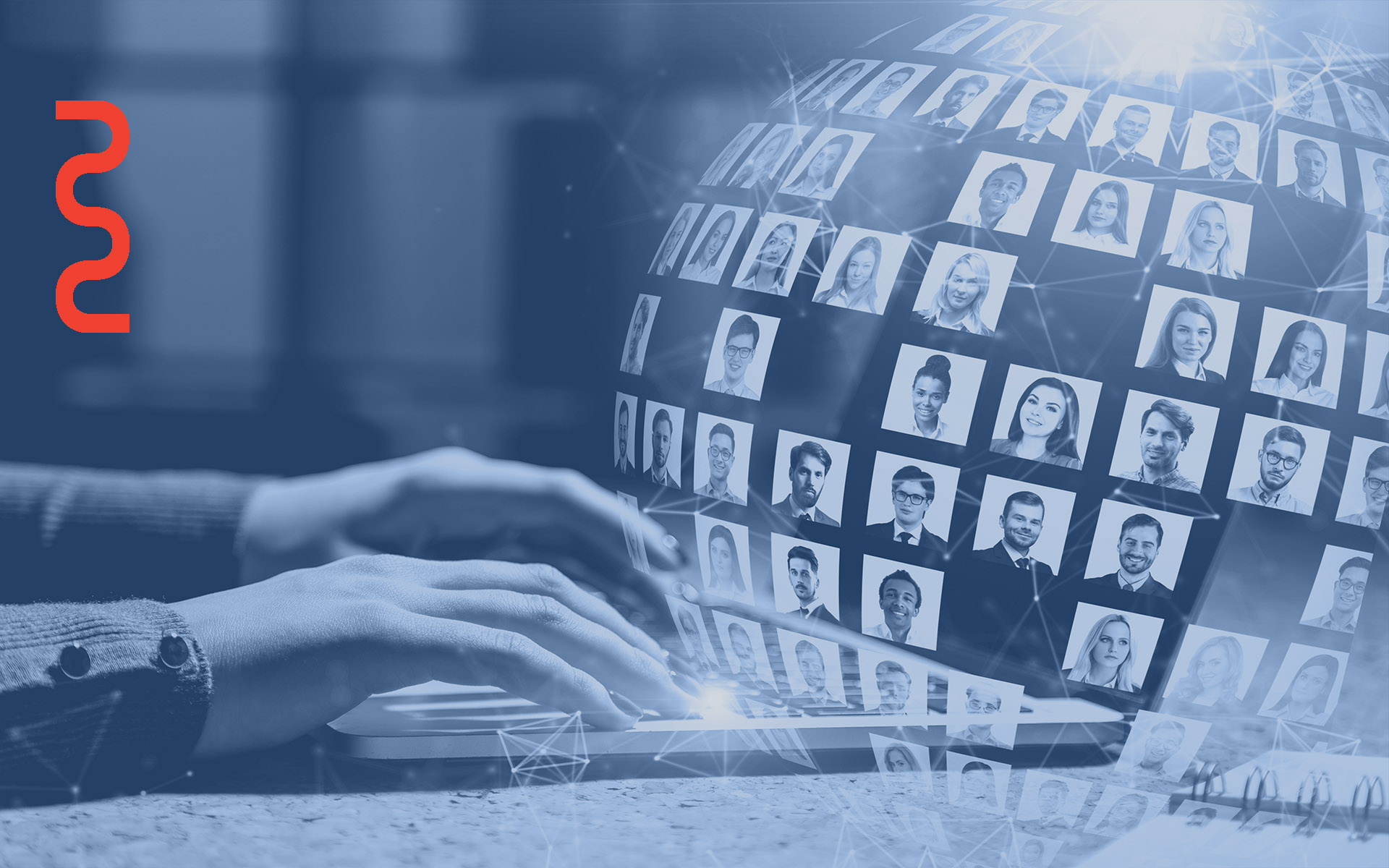What if just doing your job causes you to lose your job? New technologies have constantly replaced old technologies for hundreds of years, but new digital technologies, namely artificial intelligence and other data-driven technologies, are doing more than replacing old tech—they’re replacing the people who create those technologies in the first place.
Subscribe:
On the Delve podcast, Alain Pinsonneault, Desautels Professor of Information Systems and IMASCO Chair in Information Technology, and fellow Desautels Professor of Information Systems Emmanuelle Vaast examine how digital technology enables and threatens occupational identity—and how data scientists and others who work with digital tech cope with the associated tensions.
About 10 years ago, data analytics proved itself a secret weapon to successful, high-growth business. Suddenly, data scientists were in high demand. Universities developed data analytics Masters programs, and people who already had careers in tech flocked back to school to complete degrees that guaranteed a higher income alongside greater value to organizations.
Today, data scientists are still distinguished by their advanced data skills and fluency in programming languages. They’re able to generate insights from large data sets and qualitative unstructured data. Yet their skills must constantly be updated to keep up with the rapid evolution of digital technology—and how that technology has changed organizations they work for.
It’s a shift in occupational identity that has changed the entire outlook of data scientists and others who work with digital technologies, such as social media managers, investment analysts, and software programmers. How can they navigate these changes and still find meaning in work that might be done by AI in the near future?
Read on for an excerpt of their conversation, listen to the full podcast episode for more research-based insights, and watch the Delve video with Vaast and Pinsonneault, created for the MISQ & ASQ Joint Special Issue on Technology and Institution, 2023:
Alain Pinsonneault: Information technology is affecting several dimensions of work: it’s creating new jobs, it’s eliminating jobs, it’s profoundly changing existing jobs.
Emmanuelle Vaast: Many occupations are very affected by digital technologies today. What we can see for data scientists is going to be seen for many other occupations: these dynamics of identities; the need to constantly redefine what we do; how different are we from other occupations; are we making ourselves obsolete? It’s not a question of if it’s going to happen, but when it’s going to happen, and how it will happen.
It’s not a question of if it’s going to happen, but when.
Delve: Your research study includes six years of data from discussions from an online community of data scientists, shows that due to the nature of new technologies, data scientists and other people in digital occupations are constantly rethinking how new technologies will redefine their jobs. For those working in digital technologies today, occupational identity is in a constant shift that shows no signs of slowing down.
Emmanuelle Vaast: Occupational identity is the idea of how people are able to define themselves with regard to their work. Usually, we think about occupational identity as the answer to the question of who are we and what do we do with regards to our work… It is important for people to be able to give meaning to their work, and occupational identity is one of the main ways to associate meaning to work.
Delve: Being able to give meaning to work and have a sense of stability in it affects people’s broader sense of self. Why does occupational identity change and how does that affect people’s everyday work?
Emmanuelle Vaast: Occupational identity can change over time in the long run, because contexts change, because new technologies, including digital technologies emerge over time. So, what people do is going to change over time. Usually it can be “stable for now,” but it’s going to change, and relatively slowly. What we show in our study, is that there may not be this idea of stable-for-now occupational identity anymore, maybe a constant shift in occupational identity is happening now and will continue to happen in the future.
Occupational identity cannot be considered stable-for-now anymore.
One of the key findings is this idea that digital technologies make it so occupational identity cannot be considered stable-for-now anymore. So it’s going to be changing over time. We have this push and pull with digital technology where it can be both an enabler of the occupation and its identity but also a threat to the occupation and its identity. It’s really important to try and understand how this push and pull is actually happening, and how people, the members of this occupation, are able to solve the tensions associated with your occupational identity.
Delve: And that creates tensions for anyone working with digital technologies. Tension at work, around projects or even people, is difficult to navigate and can make just being at work difficult too. But tension around the purpose of your role and the work you do goes even deeper and can sow self-doubt or resentment. Could you talk more about these tensions and why they’re currently specific to occupational identity in digital technologies?
Alain Pinsonneault: It rests on fundamental characteristics of digital technology. Digital technology makes the boundaries between occupations fluid, and it’s made change happen very fast. It rests on two fundamental characteristics of information technology or digital technology. The first one is often called convergence. It’s the ability of information technology to integrate things, people, objects that were separated in the past that were not connected, and it integrates them in a way that changes occupations. AI and data analytics are good examples of that. This convergence brings an interesting tension of similarity and distinctiveness among and between occupations. The second key characteristic of digital technology is generativity, which is that technology constantly evolves, and quite rapidly. This brings our attention to persistence and obsolescence.
The tensions are present in almost any digital technology implementation: it always constitutes both a threat and an opportunity. There’s tension there of what the technology does, what the human does, and how to cope with that. If we think about AI, for example, AI is implemented in numerous contexts now, and it challenges one fundamental principle of management, which is if you’re responsible for something, you ought to be in control of that thing. What AI does, fundamentally, is it associates, it takes over the control of some part of the job. But in the end, the human is always responsible for the decision and for what happens. This creates a huge tension between what you control what you don’t control, while being responsible for the whole job. What we found in terms of how data scientists deal with this tension can provide some insights into other domains as well.
In the end, the human is always responsible for the decision and for what happens.
Delve: In addition to these tensions, you also explored the ways that data scientists understood their occupational identity through its similarities and differences with other jobs. How does digital technology make these occupations distinct from other occupations, whether in non-digital technology or otherwise?
Alain Pinsonneault: Digital technology occupation is a bit different because technology plays two fundamental roles. First, it’s a tool that helps data scientists or people working with digital technology—it’s the tool that helps them do their work. They fundamentally rely on digital technology to do what they’re supposed to do. The second characteristic is digital technology is at the core of their very existence. So it’s a tool, but it’s also what they create. Data scientists, for example, partly enable AI or data analytics technique. It’s the core of their job. And it’s quite ironic that these tools might actually replace data scientists because it’s automating their jobs. So they’re working with the tool to create the tool that might replace them.
For the full conversation with Emmanuelle Vaast and Alain Pinsonneault, listen to the Delve podcast episode.
This episode of the Delve podcast is produced by Delve and Robyn Fadden. Original music by Saku Mantere.
Delve is the official thought leadership platform of McGill University’s Desautels Faculty of Management. Subscribe to the Delve podcast on all major podcast platforms, including Apple podcasts and Spotify, and follow Delve on LinkedIn, Facebook, Twitter, Instagram, and YouTube.

Alain Pinsonneault
Distinguished James McGill Professor
IMASCO Chair in Information Systems

Emmanuelle Vaast
Associate Dean, Research
















